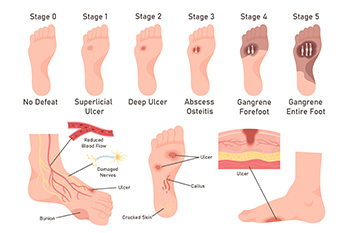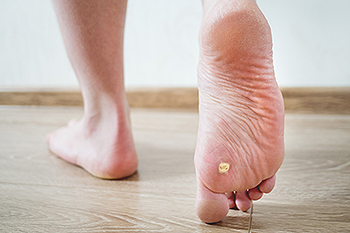Connect With Us
Blog
Items filtered by date: September 2024
The Evolution of High Heels and Their Impact on Walking

High heels have a fascinating history, originating in the 16th century when Persian cavalrymen wore them to secure their feet in stirrups. By the 17th century, high heels became a symbol of aristocracy in Europe, with both men and women sporting them. Today, high heels are primarily a fashion statement, but they drastically alter how we walk. Wearing high heels shifts your weight forward, changing your natural gait and forcing you to walk with a more rigid posture. This altered gait can strain the feet, knees, and lower back, leading to discomfort and potential long-term issues. Understanding this shift in movement helps to appreciate the balance between style and foot health, encouraging more mindful choices in footwear. Wearing high heels may cause foot conditions to develop. If this has happened to you, it is suggested that you consult a podiatrist who can guide you toward a treatment plan.
If you have any concerns about your feet, contact one of our podiatrists from Podiatry Care Specialists. Our doctors can provide the care you need to keep you pain-free and on your feet.
Biomechanics in Podiatry
Podiatric biomechanics is a particular sector of specialty podiatry with licensed practitioners who are trained to diagnose and treat conditions affecting the foot, ankle and lower leg. Biomechanics deals with the forces that act against the body, causing an interference with the biological structures. It focuses on the movement of the ankle, the foot and the forces that interact with them.
A History of Biomechanics
- Biomechanics dates back to the BC era in Egypt where evidence of professional foot care has been recorded.
- In 1974, biomechanics gained a higher profile from the studies of Merton Root, who claimed that by changing or controlling the forces between the ankle and the foot, corrections or conditions could be implemented to gain strength and coordination in the area.
Modern technological improvements are based on past theories and therapeutic processes that provide a better understanding of podiatric concepts for biomechanics. Computers can provide accurate information about the forces and patterns of the feet and lower legs.
Understanding biomechanics of the feet can help improve and eliminate pain, stopping further stress to the foot.
If you have any questions please feel free to contact our offices located in West Chester, and Broomall, PA . We offer the newest diagnostic and treatment technologies for all your foot and ankle needs.
Diagnosing Heel Pain

Diagnosing heel pain in adults involves a thorough evaluation by a podiatrist to determine the underlying cause. Common conditions include plantar fasciitis, which causes pain on the bottom of the heel, and Achilles tendinitis, which affects the back of the heel. Other possibilities include heel spurs, bursitis, or stress fractures. Diagnosis typically starts with a detailed medical history and physical examination, assessing factors like foot structure and gait. Imaging tests, such as X-rays or MRI scans, may be used to identify structural issues or rule out other conditions. Blood tests might be conducted if an inflammatory or systemic condition is suspected. Accurate diagnosis is important for effective treatment, which could include orthotics. If you have heel pain, it is suggested that you schedule an appointment with a podiatrist who can tailor an approach for addressing your specific problem.
Many people suffer from bouts of heel pain. For more information, contact one of our podiatrists of Podiatry Care Specialists. Our doctors can provide the care you need to keep you pain-free and on your feet.
Causes of Heel Pain
Heel pain is often associated with plantar fasciitis. The plantar fascia is a band of tissues that extends along the bottom of the foot. A rip or tear in this ligament can cause inflammation of the tissue.
Achilles tendonitis is another cause of heel pain. Inflammation of the Achilles tendon will cause pain from fractures and muscle tearing. Lack of flexibility is also another symptom.
Heel spurs are another cause of pain. When the tissues of the plantar fascia undergo a great deal of stress, it can lead to ligament separation from the heel bone, causing heel spurs.
Why Might Heel Pain Occur?
- Wearing ill-fitting shoes
- Wearing non-supportive shoes
- Weight change
- Excessive running
Treatments
Heel pain should be treated as soon as possible for immediate results. Keeping your feet in a stress-free environment will help. If you suffer from Achilles tendonitis or plantar fasciitis, applying ice will reduce the swelling. Stretching before an exercise like running will help the muscles. Using all these tips will help make heel pain a condition of the past.
If you have any questions please contact our offices located in West Chester, and Broomall, PA . We offer the newest diagnostic and treatment technologies for all your foot and ankle needs.
Early Intervention for Diabetic Foot Ulcers

Diabetic foot ulcers are open sores that typically form on the bottom of the feet in individuals with diabetes. These ulcers progress through several stages, each requiring careful management. In the initial stage, the skin breaks down, often due to minor injuries or pressure. As the ulcer develops, it can deepen, affecting the underlying tissue and potentially reaching the muscle or bone. At advanced stages, infection sets in, leading to serious complications like gangrene, which may necessitate amputation. Seeking early treatment is critical because the earlier the intervention, the better the chances of preventing progression. Early treatment can stop the ulcer from worsening, reduce the risk of infection, and promote faster healing. If you have diabetes, it is strongly suggested that you schedule regular appointments with a podiatrist to stay on top of any developing foot problems and prevent complications, as well as to help maintain mobility and quality of life.
Diabetic foot care is important in preventing foot ailments such as ulcers. If you are suffering from diabetes or have any other concerns about your feet, contact one of our podiatrists from Podiatry Care Specialists. Our doctors can provide the care you need to keep you pain-free and on your feet.
Diabetic Foot Care
Diabetes affects millions of people every year. The condition can damage blood vessels in many parts of the body, especially the feet. Because of this, taking care of your feet is essential if you have diabetes, and having a podiatrist help monitor your foot health is highly recommended.
The Importance of Caring for Your Feet
- Routinely inspect your feet for bruises or sores.
- Wear socks that fit your feet comfortably.
- Wear comfortable shoes that provide adequate support.
Patients with diabetes should have their doctor monitor their blood levels, as blood sugar levels play such a huge role in diabetic care. Monitoring these levels on a regular basis is highly advised.
It is always best to inform your healthcare professional of any concerns you may have regarding your feet, especially for diabetic patients. Early treatment and routine foot examinations are keys to maintaining proper health, especially because severe complications can arise if proper treatment is not applied.
If you have any questions please feel free to contact our offices located in West Chester, and Broomall, PA . We offer the newest diagnostic and treatment technologies for all your foot and ankle needs.
It's Time for Beautiful Feet
Plantar Warts and Effective Relief Methods

Plantar warts are benign growths that appear on the soles of the feet due to an infection from the human papillomavirus, or HPV. They can cause discomfort and pain, making walking or standing difficult. These warts have a rough texture and can sometimes contain tiny black dots, which are small blood vessels. Various relief methods are available for those suffering from plantar warts. Mild treatments often include salicylic acid, which helps to peel away the wart gradually. Cryotherapy, which involves freezing the wart with liquid nitrogen, is another common approach. For persistent or severe cases, a podiatrist may recommend procedures like laser therapy or minor surgical removal. Plantar warts, which are both highly contagious and stubborn, can cause extreme pain and discomfort. If you have developed this type of wart, it is suggested that you consult a podiatrist who can offer you effective relief and treatment methods.
Plantar warts can be very uncomfortable. If you need your feet checked, contact one of our podiatrists from Podiatry Care Specialists. Our doctors will assist you with all of your foot and ankle needs.
About Plantar Warts
Plantar warts are the result of HPV, or human papillomavirus, getting into open wounds on the feet. They are mostly found on the heels or balls of the feet.
While plantar warts are generally harmless, those experiencing excessive pain or those suffering from diabetes or a compromised immune system require immediate medical care. Plantar warts are easily diagnosed, usually through scraping off a bit of rough skin or by getting a biopsy.
Symptoms
- Lesions on the bottom of your feet, usually rough and grainy
- Hard or thick callused spots
- Wart seeds, which are small clotted blood vessels that look like little black spots
- Pain, discomfort, or tenderness of your feet when walking or standing
Treatment
- Freezing
- Electric tool removal
- Laser Treatment
- Topical Creams (prescription only)
- Over-the-counter medications
To help prevent developing plantar warts, avoid walking barefoot over abrasive surfaces that can cause cuts or wounds for HPV to get into. Avoiding direct contact with other warts, as well as not picking or rubbing existing warts, can help prevent the further spread of plantar warts. However, if you think you have developed plantar warts, speak to your podiatrist. He or she can diagnose the warts on your feet and recommend the appropriate treatment options.
If you have any questions please feel free to contact our offices located in West Chester, and Broomall, PA . We offer the newest diagnostic and treatment technologies for all your foot and ankle needs.

